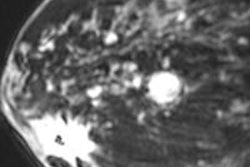Greater breast tissue density is caused by an excess of collagen, according to a new study published online May 5 in Nature Cell Biology. The increased collagen boosts the chances of breast tumors spreading and becoming more invasive.
The finding could help clinicians develop drug treatments that prevent metastasis, according to researchers at Washington University School of Medicine in St. Louis (Nature Cell Biology, May 5, 2013).
Dr. Gregory Longmore and colleagues used mouse models of breast cancer and breast tumor samples from patients to show that a protein called DDR2, which sits on the surface of tumor cells, binds to collagen and encourages tumor cells to spread. Longmore's team found that DDR2 helps to maintain high levels of another protein, called SNAIL1, inside a tumor cell's nucleus, a necessary state for a tumor cell to spread. SNAIL1 has long been associated with breast cancer metastasis, according to Longmore's group.
DDR2 does not initiate the high levels of SNAIL1, but it is required to keep them elevated, the team wrote. A drug that blocks DDR2 from binding with collagen wouldn't destroy the tumor, but it could inhibit the invasion of these tumors into surrounding tissue and reduce metastasis, Longmore and colleagues concluded.



















